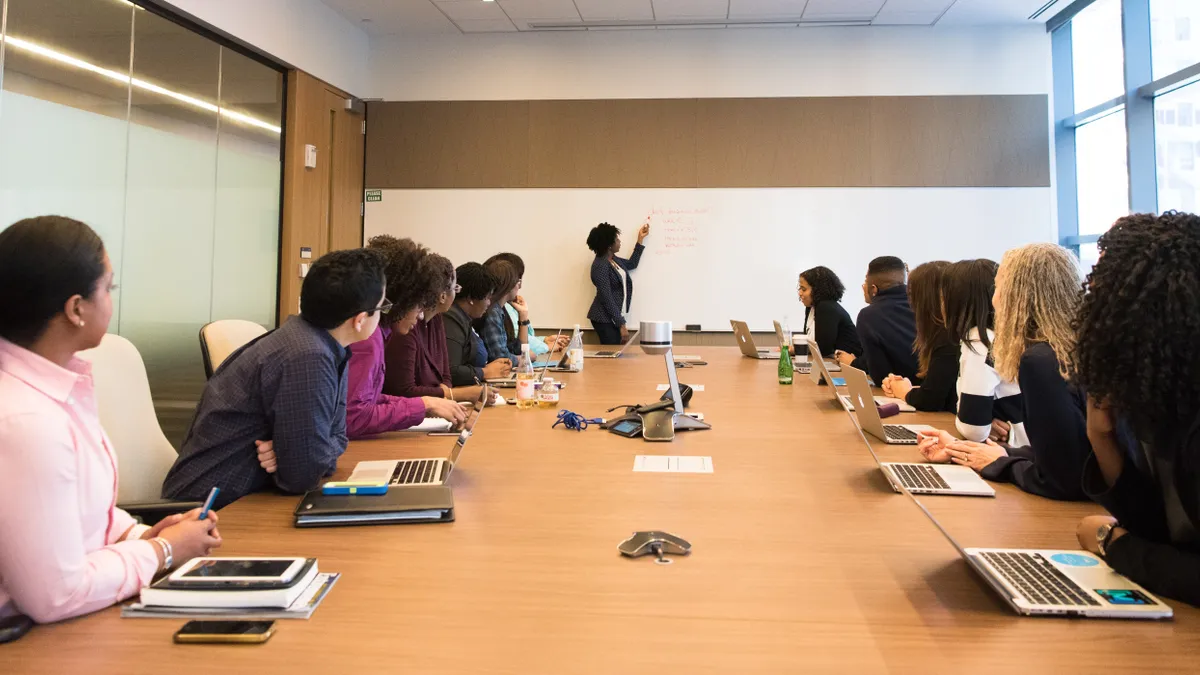After launching a business offering in 2019, Codecademy saw a large spike in contracts last fall. Founder and CEO Zach Sims attributes this rise to employers’ increasing interest in learning as an engagement and retention strategy as a result of the coronavirus pandemic.
"There's a lot of people that are using it to promote employee engagement and culture, especially while all teams are remote," Sims told HR Dive, noting that education can demonstrate investment in employees.
Inclusivity, community are key
Codecademy provides both free and enterprise training on multiple programming languages — a topic that seems intimidating to some, Sims said. But it’s not just technical roles that can benefit from learning to program, Sims said; it "is important for an organization." The company reports that about half of its enterprise users do not work in technical roles.
The key is making the training inclusive, Sims said. "I think that's showing people proof of progress along the way, celebrating small achievements, and helping people understand that it's not just about passing or failing but it's about the progress you're making and it's about building something."
Another key to success for organizations is building community around learning, Sims said, echoing sentiments shared by other online learning providers such as LinkedIn Learning and Salesforce.
"We encourage our learners to form clubs and small organizations within their company, so that they are able to [...] take that learning and implement it and work with people on a regular basis," Sims said. He added that L&D leaders have taken on new responsibilities for ensuring that employees take advantage of learning opportunities. "I think a lot of that is different from again the classic L&D [approach] of providing the curriculum and material without necessarily a way for people to work together and benefit from what they’re learning."
A boon for diversity
Like with other online learning providers, a Codecademy certification often confirms the owner has a valuable, transferable skill that employees can leverage across their careers.
"Companies need to invest in their employees, not just to keep them at their own company forever," Sims said, "but, acknowledging that mobility is real; the best companies understand that." Top employers understand they are developing employees to be more valuable in the job market, but today that is just part of creating a strong workplace culture, he continued.
While undergraduate degrees and graduate education still drive many well-paying jobs in the business world, Sims sees more movement toward credential-based evaluation of job candidates and employees, which he said he believes will help clarify things in the job market and ultimately start to address the well-documented digital skills gaps employers feel.
And because of the lowered barriers to entry for this kind of education, Sims said he sees Codecademy for Business and the like as a way to diversify candidate pools and perhaps identify "non-traditional candidates" — such as people who understand a company or industry really well but are not well-trained technically — to develop into valuable technical employees.
Enhanced corporate learning efforts are "giving people the option to hire new, more diverse talent," Sims said, "to take chances on people in a way that maybe they couldn't before because they weren't sure how they would train and help uplevel those people once they join the organization."












